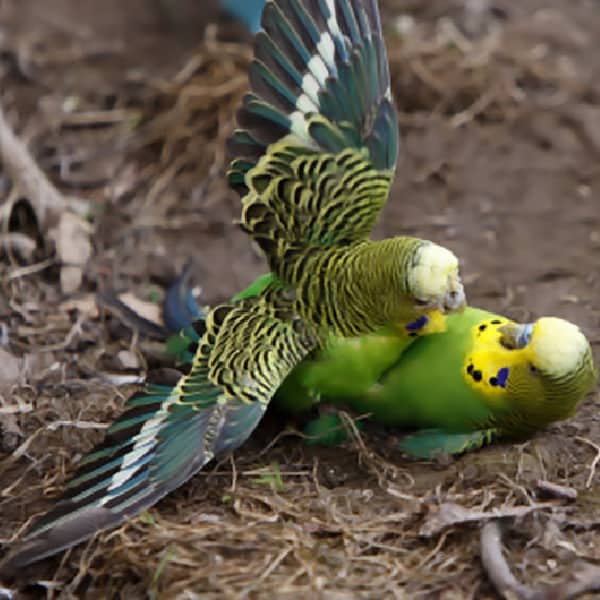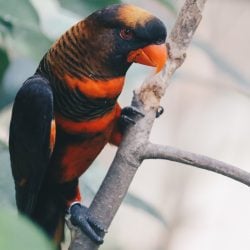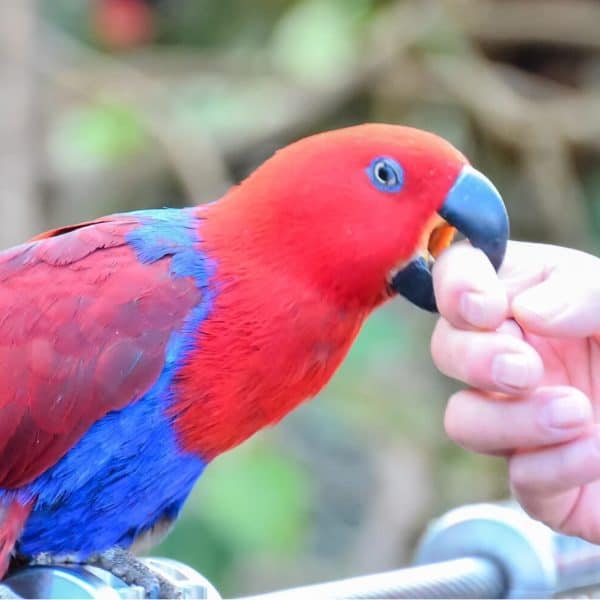
7 Budgie And Parakeet Questions Answered
Last Updated on by Mitch Rezman
Question about Male Parakeet.
Every time I put my arm in the cage he attacks it, or he flies at me when I look in the cage.
My female looks depressed like she would rather he move out.
She used to be so happy.
I got her first, then him a couple of months after.
She would sing, and play with her toys.
Now all she does is sit on the same perch and hardly moves.
He doesn’t seem to fight with her.
He just likes to attack me.
Do you think I should take him to a pet shop to find him a new home?
I just had him for 4 months.
I just don’t know what to do.
Can female parakeets get along together?
I thought I would take him to the pet store, then get another parakeet.
Thank you
Hi Katheryn,
Let’s start by not putting your arm in the cage.
You are invading the bird’s territory and he doesn’t appreciate it.
Make a point of every time you walk by the cage drop a treat in his food dish or a separate treat cup so that he begins to associate good things happening when you come by.
How many toys do you have in the cage?
It’s important that you have many toys in the cage not only to engage with but so the budgies can have private areas of their own. A small perch in a corner behind a toy is a nice addition.
It is also a good idea to have two water dishes and two food dishes so one parakeet does not block the other parakeet from eating nor drinking.
“Swapping” out birds will not solve your problem because nobody can predict the behavior of the next bird. We don’t like to treat pets as “disposable”.
There’s no reason your birds can’t get along other than the way your cages are set up.
I would also introduce a millet spray – every day – note daily millet that they can share without getting too close one another as a form of socialization
Hope that helps
Best MitchR
My budgies are scared of me because I had to pick them to put them in their cage. What should I do to make them not afraid of me?
MitchR answers
Budgies can be skittish until they get to know you.
Start by clipping their wings so they don’t fly away when out of the cage.
Don’t try to take them out of the cage, lure them out.
One of the best tools to tame budgies is millet.
Once out of the cage make sure they have their own play area where they can enjoy playtime while watching you.
Make all your interaction positive especially when putting them back in the cage.
It’s best to have lighting over the birdcage on a timer for 12 hours of light and 12 hours of darkness to help keep their circadian rhythms synchronized and hormonal behavior down.
I think my Alexandrine Parakeet is egg bound but I don’t know if I am sure.
She has been laying eggs for 15 days now.
There are 4 eggs currently that she is tending to so maybe that is how the bottom of an egg-laying parakeet looked like?
A little red but that’s it.
She is active and eats healthy not at all depressed.
Thankfully but I’m still worried.
I can’t inspect her as she is insistent on sitting on her eggs and not getting up at all (gets very protective if I try to pick her up)
Her poops are neither that wet nor too dry.
Hello Zee
It is important is that you pick her up and examine her. Hold her head between your index finger and her middle finger so she cannot bite you.
Then cradle her body in the palm of your hand so you can examine her.
Unless you have an expert eye only a veterinarian can determine if a bird has an egg stuck.
You should remove the eggs she is laying on – all it does is encourage further brooding activities.
I hope this information helps hello best of luck.
Identifying traits of the egg binding issue
- Abdominal straining
- Bobbing or wagging of the tail
- Drooping of the wings (canaries)
- Wide stance
- Depression
- Loss of appetite
- Lameness or leg paralysis (the egg puts pressure on the nerves going to the legs)
- Distended abdomen
- Droppings stuck to the vent area (the bird cannot raise her tail when passing waste)
- Fluffed feathers
- Weakness
- Difficulty breathing (the retained egg puts pressure on the air sacs)
- Sitting on the floor of the cage
- Possible prolapse of part of the reproductive tract (the inner part of the reproductive tract is pushed out so that it is visible as a pink mass protruding from the cloacal opening)
- Occasionally sudden death
The treatment will depend on the condition of the bird, the severity of the signs, where the egg is located, and the length of time the bird has been eggbound.
This condition is more serious in smaller birds (canaries and finches) who may die within a few hours if not treated.
For a bird that shows a minimum of depression, treatment may include:
- Elevation of the humidity and increasing the environmental temperature to 85-95°F
- Lubrication of the vent
- Injection of calcium, and possibly vitamins A, D, and E, and selenium
- Administration of fluids and dextrose
- Injection of oxytocin or arginine vasotocin, or application of a prostaglandin gel. These medications cause contraction of the reproductive tract and may result in the passing of the egg. They should not be used if an obstruction is present.
- Continued access to food and water
We hope this works out well for you
Why are Budgies referred to as both the English and Australian Parakeet?
Personally, I think your question is inverted.
The majority of humans both inside and outside of the caged bird-keeping world use the term “parakeet” far too loosely.
Budgies are generally referred to as parakeets, when in fact there are approximately 370 parakeets species.
We know of approximately 120 species of Conures and know that all conures are parakeets but not all parakeets are conures.
Thus when one speaks of an English or an Australian budgie they’re talking about the same species but the English Budgie is a product of years of selective breeding.
While the Australian budgie has to endure the hardships of the outback deserts, migrating food sources, limited water, and adversarial raptors, English budgies have to endure Britain’s crappy weather, it’s lousy food and warm beer.
Is it true that when a Budgie that is kept as a pet escapes into the wild, the other birds kill it because it’s different?
Animals fall under the same laws of nature that people do, God gives you so many heartbeats IMHO (In My Humble Opinion).
Ironically we had a cockatiel for three years who ended up dying of cancer.
I rescued her because she was stuck in some bushes 2 1/2 blocks from our shop.
We get many “trapped” exotic bird calls from Chicago PD and fire.
I’ve seen my share of escaped birds.
One of our four budgies, the first, Bacon was found ensnared in a tree across from our shop and some good Samaritan rescued him using our ladder and net.
And don’t think for a moment that a predatory bird cares about “which” bird.
I’ve studied under a master falconer.
This black falcon just wants its next meal – here’s a great illustration.
Feathered factoid – Falcons have about a 25% accuracy rate for in-flight kills.
Why do my Budgies fight?
I have a pair of male and female budgies, neither of them fought in the pet store.
In fact, they were grooming each other.
It’s been 2 weeks with them and they nip each other occasionally and fight sometimes.
MitchR answers
First off you may not have a female and male because as budgies age the cere (fleshy nostril area) changes color and you can be fooled.
If I had to guess and you are more than welcome to send me a picture (look at my profile for contact information) you might have to do some cage rearranging.
With multiple birds, it’s best to offer two sets of food dishes in two sets of water dishes.
It would also be helpful to provide a couple of privacy areas using bird toys so that one or the other bird can find a little safety in a closed area
Tropical birds also get cranky with erratic light cycles in North America so I strongly advocate a full spectrum light on top of the cage attached to a timer providing 12 hours of darkness and 12 hours of light.
This will help keep their circadian clock more synchronized with their current environment.
Think about introducing clicker training to one bird at a time in a separate room for their full attention as when two birds have bonded and they cut you out of the relationship it is very difficult to train them.
In this case, I would definitely keep both birds flighted so that if there is a squabble one can easily fly away to another part of the cage assuming cages enough to allow flight.
Hope that helps
I recently rescued an Escaped Budgie
I recently rescued an escaped budgie (parakeet) that came from an owner who kept her outdoors in very inhumane conditions.
She behaves as if feral/wild, almost as you would expect a finch would. How can I earn her trust?
MitchR answers
There are a number of ways to earn any bird’s trust. Rather than responding redundantly here’s an option that you might not have thought about.
It starts with the story that you can read about here.
Bacon clearly had found us but wanted nothing to do with the new humans.
We clipped her wings and spent a week or two trying to engage with her but it was clear whether she was in the cage or out of the bird cage she was not a happy bird.
We got her a more appropriate flight birdcage and then rescued a second budgie.
Within a couple of days, the two budgies were getting along famously.
With plenty of room, we talked about adding another pair which literally showed up on the table at the National Caged Bird Club show in St. Charles Illinois.
We introduced the second pair to Bacon and her counterpart Eggs naming them Toast and Jam.
Fast forward 14 months later and we have one boy, (Jam) and three girls in a happy little community they tolerate my hand in the cage to change food and water twice daily.
What budgies do when you’re not watching
Other than that none of them want anything to do with the humans or the other bird, our Senegal.
Should we decide to socialize the birds it will be much harder because the four of them have bonded.
I just wanted to give you an alternate path to take.
Best of luck
MitchR
Author Profile
Latest entries
 The Traveling BirdJune 26, 2025Can You Name 5 Parrot Species That Are Living Wild in the USA?
The Traveling BirdJune 26, 2025Can You Name 5 Parrot Species That Are Living Wild in the USA? Bird BehaviorJune 26, 2025How is it Parrots Are Problem Solvers Social Animals and Even Use Tools?
Bird BehaviorJune 26, 2025How is it Parrots Are Problem Solvers Social Animals and Even Use Tools? Bird & Parrot AnatomyJune 25, 2025How a Tiny Chemical Modification Makes Parrots Nature’s Living Paintings
Bird & Parrot AnatomyJune 25, 2025How a Tiny Chemical Modification Makes Parrots Nature’s Living Paintings PigeonsJune 20, 2025How Do Parrots Thrive in Cities Outside Their Native Habitats?
PigeonsJune 20, 2025How Do Parrots Thrive in Cities Outside Their Native Habitats?
This Post Has 2 Comments
Leave a Reply
You must be logged in to post a comment.



K. Gallagher
25 Mar 2018It sounds to me as if the male budgie above might not have been kept in a separate cage initially so that the two birds could hear and see each other for at least a couple of weeks before seeing if they’d be compatible. I always, after the time of keeping them apart to be sure everyone’s healthy, move the two cages closer over a period of a couple of days and then (depending on who is flighted and so forth) put the cages together so they can visit back and forth if they want. Ideally, they’ll decide to move in together. I’ve never had a problem with this, though I usually bring a younger bird in to join an adult one. But you want the birds involved to decide they want to share a cage. I would also ask how big a cage these birds are in. But I would separate them and start this “getting to know you” process over if they were mine. Kathleen
WindyCityParrot
25 Mar 2018Great points Kathleen